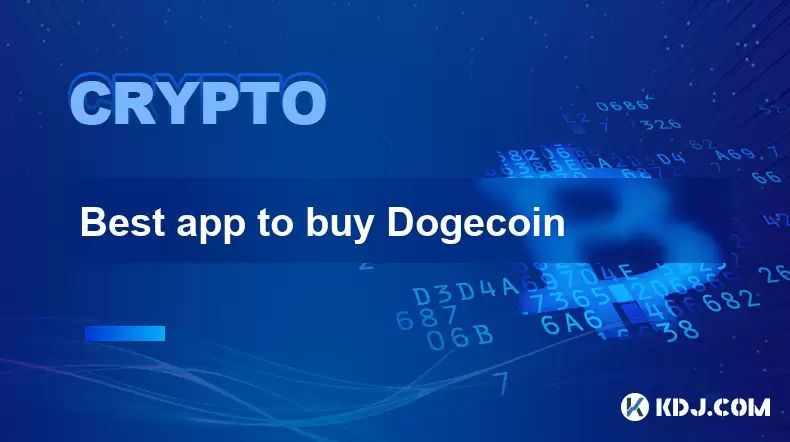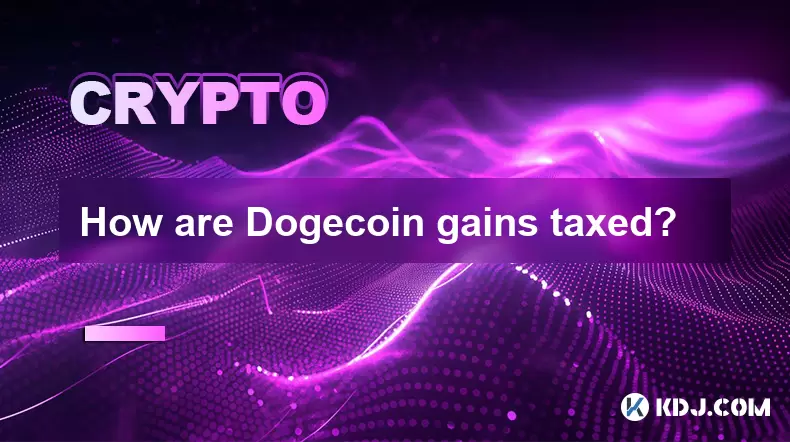-
 bitcoin
bitcoin $87959.907984 USD
1.34% -
 ethereum
ethereum $2920.497338 USD
3.04% -
 tether
tether $0.999775 USD
0.00% -
 xrp
xrp $2.237324 USD
8.12% -
 bnb
bnb $860.243768 USD
0.90% -
 solana
solana $138.089498 USD
5.43% -
 usd-coin
usd-coin $0.999807 USD
0.01% -
 tron
tron $0.272801 USD
-1.53% -
 dogecoin
dogecoin $0.150904 USD
2.96% -
 cardano
cardano $0.421635 USD
1.97% -
 hyperliquid
hyperliquid $32.152445 USD
2.23% -
 bitcoin-cash
bitcoin-cash $533.301069 USD
-1.94% -
 chainlink
chainlink $12.953417 USD
2.68% -
 unus-sed-leo
unus-sed-leo $9.535951 USD
0.73% -
 zcash
zcash $521.483386 USD
-2.87%
How to get Dogecoin at a low price through cryptocurrency arbitrage?
Dogecoin arbitrage involves buying DOGE on one exchange at a lower price and selling it on another at a higher price, requiring speed and access to multiple platforms.
Apr 01, 2025 at 01:14 am

Understanding Cryptocurrency Arbitrage and Dogecoin
Cryptocurrency arbitrage exploits price discrepancies of the same cryptocurrency across different exchanges. This means buying Dogecoin (DOGE) on one exchange where it's cheaper and simultaneously selling it on another where it's more expensive, pocketing the difference as profit. This requires speed, efficiency, and access to multiple exchanges. The profit margin is often small but can accumulate significantly with volume. Remember, market volatility and transaction fees can impact profitability. Understanding DOGE's price fluctuations on different platforms is crucial for successful arbitrage.
Identifying Arbitrage Opportunities for Dogecoin
Finding arbitrage opportunities requires constant monitoring of multiple cryptocurrency exchanges. You need to track DOGE's real-time price across various platforms. Several websites and tools provide real-time cryptocurrency price comparisons, but you must verify their accuracy independently. Manual tracking is time-consuming but can be effective. Automated trading bots can also be used, but they come with their own set of risks and require technical expertise. Successful arbitrage relies on swiftly identifying and capitalizing on fleeting price differences.
Steps Involved in Dogecoin Arbitrage
- Choose Reputable Exchanges: Select at least two exchanges known for their liquidity and reliability in trading DOGE. Consider factors like transaction fees, security, and ease of use.
- Analyze Price Differences: Continuously monitor DOGE's price on your chosen exchanges. Look for instances where the price difference is significant enough to cover transaction fees and still yield a profit.
- Execute the Trade: Once you identify an arbitrage opportunity, act swiftly. Buy DOGE on the exchange with the lower price and immediately sell it on the exchange with the higher price. Speed is crucial to avoid price fluctuations wiping out your potential profit.
- Manage Risk: Arbitrage is not risk-free. Sudden price drops or unexpected delays can lead to losses. Only invest what you can afford to lose. Diversify your investments across multiple cryptocurrencies and arbitrage opportunities.
- Utilize Trading Bots (Optional): Automated trading bots can help automate the process, but they require technical expertise and carry inherent risks. Thoroughly research and understand any bot before using it.
Factors Affecting Dogecoin Arbitrage Profitability
Several factors influence the profitability of DOGE arbitrage. Transaction fees significantly impact your profit margin. Different exchanges charge different fees, so selecting exchanges with lower fees is essential. Network congestion can also cause delays, potentially leading to missed opportunities or losses. Market volatility is a major factor; sudden price swings can quickly eliminate potential profits. Exchange liquidity is crucial; insufficient liquidity on either exchange can prevent you from executing trades efficiently.
Risks Associated with Dogecoin Arbitrage
Arbitrage carries inherent risks. Price volatility is a major risk; rapid price changes can wipe out profits or even lead to losses. Exchange downtime or technical issues can disrupt your trades, causing delays and missed opportunities. Security risks are always present when dealing with cryptocurrency exchanges; choose reputable exchanges with robust security measures. Regulatory changes can impact the legality and profitability of arbitrage.
Minimizing Risks in Dogecoin Arbitrage
To minimize risks, thoroughly research and select reputable exchanges with a strong track record. Diversify your investments across multiple cryptocurrencies and arbitrage opportunities. Use secure wallets to store your DOGE and other cryptocurrencies. Stay updated on market trends and regulatory changes to anticipate potential risks. Only invest what you can afford to lose.
Advanced Strategies for Dogecoin Arbitrage
Advanced strategies involve using more sophisticated tools and techniques. This might include using algorithmic trading bots, which require significant technical expertise and programming skills. Understanding technical analysis and utilizing indicators can help predict short-term price movements, improving your timing and increasing the likelihood of successful arbitrage. However, these strategies also increase the risk significantly.
Legal and Regulatory Considerations
Always ensure your arbitrage activities comply with local and international regulations. Tax implications of cryptocurrency arbitrage vary by jurisdiction, so it's crucial to understand and comply with tax laws in your region. Consult with a tax professional if you have any questions or concerns regarding tax liabilities. Some jurisdictions have specific regulations regarding cryptocurrency trading and arbitrage, so it’s vital to stay informed about these regulations.
Frequently Asked Questions
Q: Is Dogecoin arbitrage profitable?A: Dogecoin arbitrage can be profitable, but it's not guaranteed. Profitability depends on several factors, including the price difference between exchanges, transaction fees, and market volatility. Small profits on many trades can add up, but losses are also possible.
Q: What are the best exchanges for Dogecoin arbitrage?A: There's no single 'best' exchange. The optimal choice depends on factors like fees, liquidity, security, and your location. Research several exchanges and compare their offerings before selecting them for arbitrage.
Q: How much can I earn from Dogecoin arbitrage?A: Earnings vary greatly depending on the size of your investment, the frequency of arbitrage opportunities, and the price differences between exchanges. Profit margins are usually small on individual trades, but they can accumulate over time.
Q: Are there any risks involved in Dogecoin arbitrage?A: Yes, several risks exist, including price volatility, exchange downtime, security breaches, and regulatory changes. It's crucial to manage these risks effectively to minimize potential losses.
Q: What tools can I use for Dogecoin arbitrage?A: Several tools can assist, including cryptocurrency price comparison websites, automated trading bots, and charting software. However, always verify the accuracy and reliability of any tool before using it.
Q: Do I need programming skills for Dogecoin arbitrage?A: Basic arbitrage doesn't require programming skills. However, utilizing advanced strategies like algorithmic trading bots often necessitates programming knowledge.
Disclaimer:info@kdj.com
The information provided is not trading advice. kdj.com does not assume any responsibility for any investments made based on the information provided in this article. Cryptocurrencies are highly volatile and it is highly recommended that you invest with caution after thorough research!
If you believe that the content used on this website infringes your copyright, please contact us immediately (info@kdj.com) and we will delete it promptly.
- Super Bowl LX: Coin Toss Trends Point to Tails Despite Heads' Recent Surge
- 2026-01-31 07:30:02
- Aussie Prospector's Ancient Find: Japanese Relics Surface, Rewriting Gold Rush Lore
- 2026-01-31 07:20:01
- US Mint Adjusts Coin Prices: Clad Collector Sets See Significant Hikes Amidst Special Anniversary Releases
- 2026-01-31 07:20:01
- THORChain Ignites Fiery Debate with CoinGecko Over Bitcoin DEX Definitions: A Battle for True Decentralization
- 2026-01-31 07:15:01
- Fantasy Football Frenzy: Key Picks and Pointers for Premier League Round 24
- 2026-01-31 06:40:02
- Cryptocurrencies Brace for Potential Plunge in 2026 Amidst Market Volatility
- 2026-01-31 07:15:01
Related knowledge

Bitcoincoin burning mechanism
Jul 20,2025 at 09:21pm
What is the Dogecoin burning mechanism?The Dogecoin burning mechanism refers to the process of permanently removing DOGE tokens from circulation by se...

How to earn free Bitcoincoin?
Jul 19,2025 at 10:08pm
What is Dogecoin and Why Earn It?Dogecoin (DOGE) started as a meme-based cryptocurrency in 2013 but has grown into a widely recognized digital asset. ...

Is Coinbase a good wallet for Bitcoincoin?
Jul 19,2025 at 04:42pm
Understanding Coinbase as a Wallet Option for DogecoinWhen considering where to store Dogecoin, Coinbase is often mentioned as a potential option due ...

How to buy Bitcoincoin with PayPal?
Jul 23,2025 at 06:57am
Understanding the Basics of Buying DogecoinBefore diving into the process of buying Dogecoin with PayPal, it’s essential to understand what Dogecoin i...

Best app to buy Dogecoin
Jul 23,2025 at 03:08pm
What Is a Cryptocurrency Exchange and How Does It Work?A cryptocurrency exchange is a digital marketplace where users can buy, sell, or trade cryptocu...

How are Dogecoin gains taxed?
Jul 25,2025 at 07:01am
Understanding the Taxation of Dogecoin GainsWhen it comes to Dogecoin (DOGE), many investors are drawn to its meme-inspired branding and volatile pric...

Bitcoincoin burning mechanism
Jul 20,2025 at 09:21pm
What is the Dogecoin burning mechanism?The Dogecoin burning mechanism refers to the process of permanently removing DOGE tokens from circulation by se...

How to earn free Bitcoincoin?
Jul 19,2025 at 10:08pm
What is Dogecoin and Why Earn It?Dogecoin (DOGE) started as a meme-based cryptocurrency in 2013 but has grown into a widely recognized digital asset. ...

Is Coinbase a good wallet for Bitcoincoin?
Jul 19,2025 at 04:42pm
Understanding Coinbase as a Wallet Option for DogecoinWhen considering where to store Dogecoin, Coinbase is often mentioned as a potential option due ...

How to buy Bitcoincoin with PayPal?
Jul 23,2025 at 06:57am
Understanding the Basics of Buying DogecoinBefore diving into the process of buying Dogecoin with PayPal, it’s essential to understand what Dogecoin i...

Best app to buy Dogecoin
Jul 23,2025 at 03:08pm
What Is a Cryptocurrency Exchange and How Does It Work?A cryptocurrency exchange is a digital marketplace where users can buy, sell, or trade cryptocu...

How are Dogecoin gains taxed?
Jul 25,2025 at 07:01am
Understanding the Taxation of Dogecoin GainsWhen it comes to Dogecoin (DOGE), many investors are drawn to its meme-inspired branding and volatile pric...
See all articles










































































